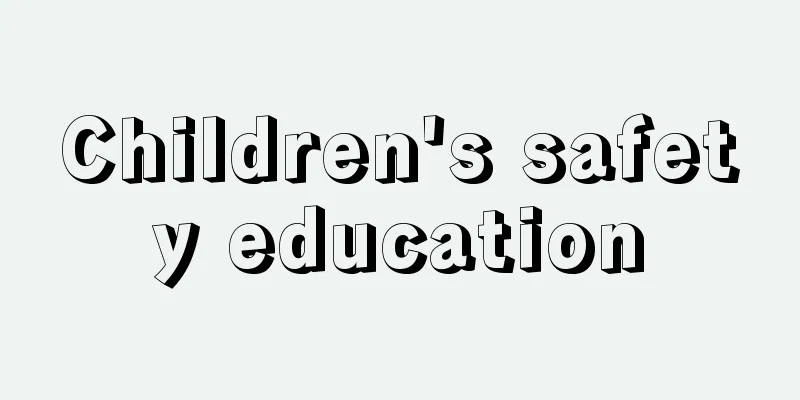Children's safety education

|
For children, as long as they can play with it, they like it, regardless of whether it is safe or not. Because except for those at their age, they cannot distinguish between good and bad things and their safety. At this time, it is very important for parents to educate their children about safety knowledge. However, due to different levels of education, some parents do not provide their children with adequate safety knowledge education. So what aspects should we pay attention to in children's safety education? What does child safety include? Children's safety management is very important and is also a big concern for many parents. We should pay attention to the following three aspects: 1. Use fire safely. More and more families are using gas. People are not allowed to sleep in kitchens where gas is installed or where there are gas pipes, to avoid gas leakage and poisoning. Someone should be present when using gas and don't forget to turn off the switch. Children must not be allowed to play with the gas switch in the kitchen. When using kerosene and coal stoves, keep them at a certain distance from flammable materials. Prevent coal stove gas from escaping. 2. Use electricity safely. The wires of household appliances must be passed through places where they will not be in the way, to prevent leakage of electricity due to damage to the protective covering due to friction, pulling, and collision. Power sockets must be securely placed where they cannot be touched in daily life, and children must not be given the opportunity to touch the sockets. For various household electrical appliances, do not press buttons with wet hands and do not allow children to play with them. Electric irons, soldering irons, electric stoves, etc. must be turned off after use. If the TV uses an outdoor antenna, you should stop watching and unplug the antenna during a thunderstorm. People who are not familiar with electrical appliances should not disassemble and repair them by themselves. 3. Prevent other accidents. Scissors, fruit knives, razor blades and thermoses are all dangerous items for children. Are they placed in the right place? If you live in a building, make sure the screen windows are closed tightly to avoid the danger of children playing by the window pushing the window open and falling out. When you open the door, be careful to see if it is shut suddenly by the wind and does not knock down or crush children who are playing in front of the door. Children's safety education When parents educate their children, they can use the following safety knowledge to help them develop a sense of safety in their daily lives and prevent accidents. 1. Do not play with matches or lighters. Not only will you burn yourself, but the fire cannot be controlled and will ignite other objects or even the entire room, causing a fire. 2. Do not use candles to look for things in small places such as the bed, under the bed, in the closet or in the attic. Doing so can easily cause a fire. In addition, lit candles should be kept away from flammable and explosive items, and special attention should be paid to the stability of candles and candlesticks. 3. On the bus, do not play or talk loudly, and do not keep changing seats or run, jump and play in the car to avoid bumping into other passengers or disturbing others. 4. Do not throw empty cans or garbage out of the car. This will not only destroy the cleanliness of the environment, but also easily hit pedestrians or other vehicles on the road, causing unnecessary trouble to yourself and others. 5. Never climb high walls or fences, because you are still young and it is not easy to maintain your body balance when climbing to a high place, so you may easily fall down and get injured. In addition, many fences are topped with sharp iron spikes or broken glass, and if you are not careful when climbing, you will be stabbed. 6. Do not climb to high places without safety facilities, such as hills, cliffs, etc. If you lose your grip or footing and fall, you may suffer from broken arms or legs and bleeding at the very least, or fractures, paralysis, or even life-threatening conditions. 7. When playing outdoors, never climb electric poles. If you encounter electric wires that have fallen to the ground or are hanging in the air, be sure to go around them because they may be wires carrying high voltage or strong electricity. 8. When you are at home, never turn on or off lights or touch other power switches with wet hands. ... Common issues with child safety Children's safety issues have always been a concern of schools, families and society. However, due to many misunderstandings in safety education, children's safety awareness and self-protection ability are still relatively low. The following are common issues regarding child safety. 1. Children’s safety awareness and self-protection ability are not optimistic. In daily life, our children rarely have a sense of safety, and even many parents rarely pay attention to their own safety issues at all times. The self-protection ability of children is worrying. 2. There are many misunderstandings in children’s safety education. 1. Safety education tends to be empty preaching. For example, parents often remind their children: "Go home early after school and be careful of bad people." These words are rather abstract and empty, and the children don't know what it means to "be careful of bad people." Therefore, when some problems arise, they are often at a loss, and accidents and tragedies occur as a result. 2. There is an obvious lag in safety education. Parents usually provide relevant education to their children only after something happens to them or some incident happens around them, acting as "firefighters", which leads to some inevitable tragedies. 3. The problem of focusing on protection and neglecting education is widespread. Children's safety has always been a concern for parents and teachers. In order to prevent accidents from happening to their children, parents are always cautious and protect and guard their children at all times. When children are in danger, it is more common for adults to take over and handle the situation on their behalf, rather than educating children on how to deal with such situations and how to protect themselves from harm. In addition, there are certain problems with the school's safety education for primary school students. Many schools do not offer special survival education courses for primary school students, and this is especially true in our rural primary schools. Therefore, as teachers, we must speed up the pace of safety education, and parents should also participate more actively. |
<<: Can a three-year-old baby drink honey?
>>: How long does it take for a child to see?
Recommend
When does the fontanelle of a newborn close?
For newborn babies, there are generally four font...
What are the autumn health recipes for children?
Children's growth and development are very fa...
What disease causes abdominal pain in children?
It is a common phenomenon for children to experie...
What to do if your child has low platelets
We all know that children are very prone to illne...
Why do children blink when watching TV?
Nowadays, almost every family has a TV. Children ...
Why does my baby like to shake his head when sleeping?
Babies are the flowers of the motherland and the ...
The benefits and timing of baby swimming
In recent years, parents have paid more and more ...
Causes of high red blood cell count in children
If a child's red blood cell count is high, pa...
What are the treatments for snoring in children?
When children snore at night, many parents think ...
How to relieve retching in newborns
Every time a newborn baby retches and asks for le...
What causes bacterial infections in children?
Do mothers know? Children are most susceptible to...
What are the symptoms of ADHD in three-year-old children?
Children are always the group that parents care a...
What to check for short height in children
Children's height is constantly increasing du...
The symptoms of papules in children are actually very obvious
Once infants and young children suffer from papul...
What should I do if my child’s anus hurts?
In life, whether adults or children, the body wil...









